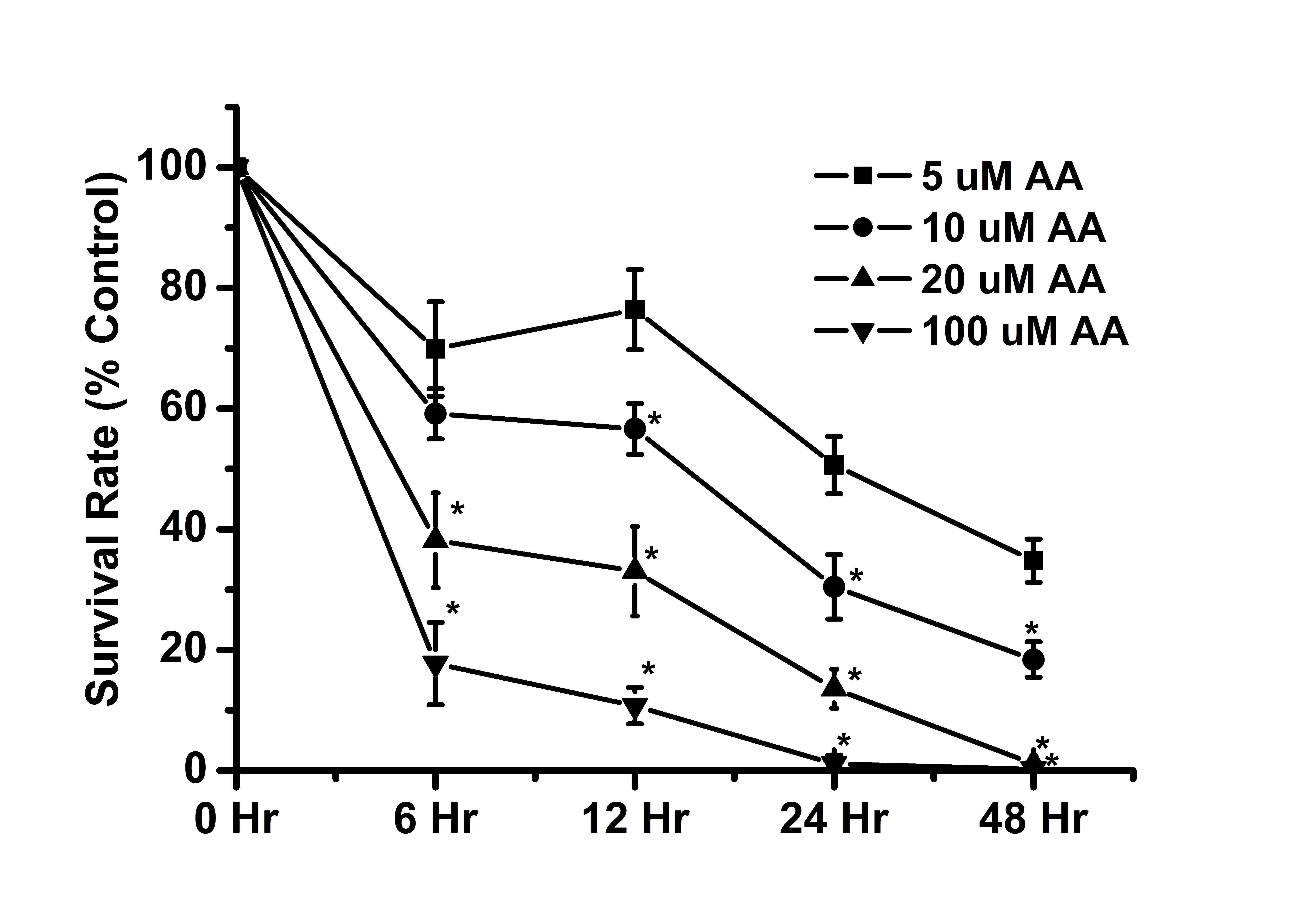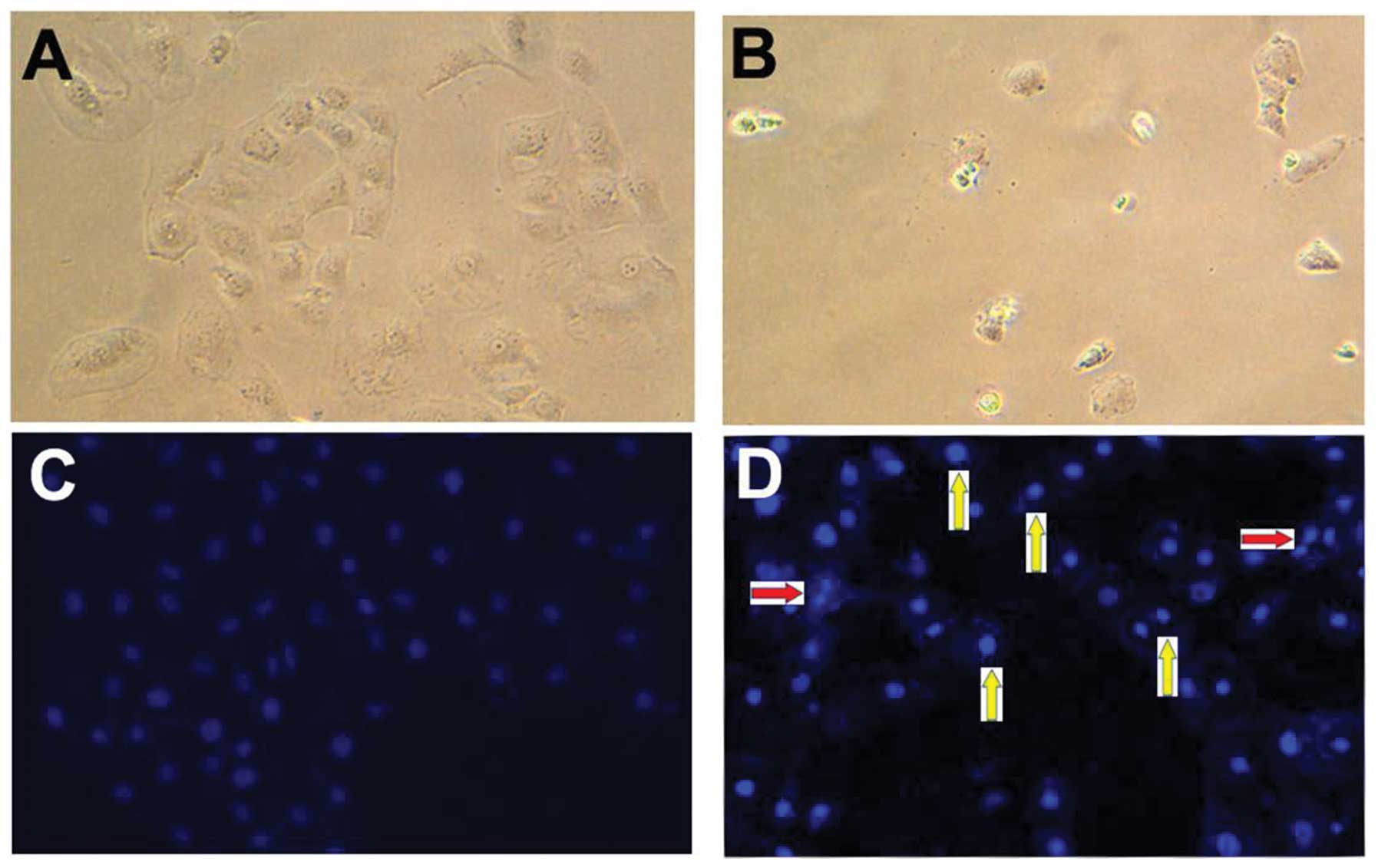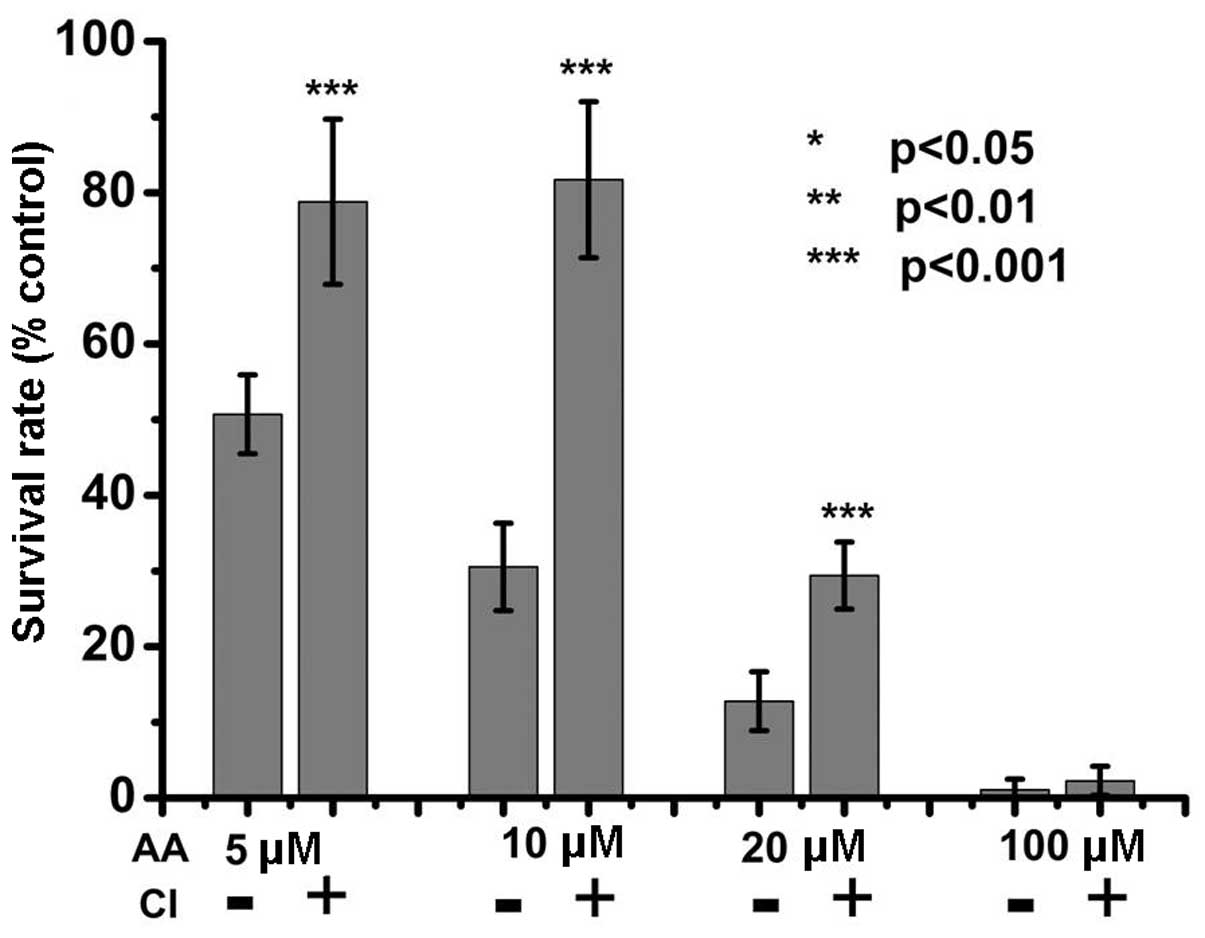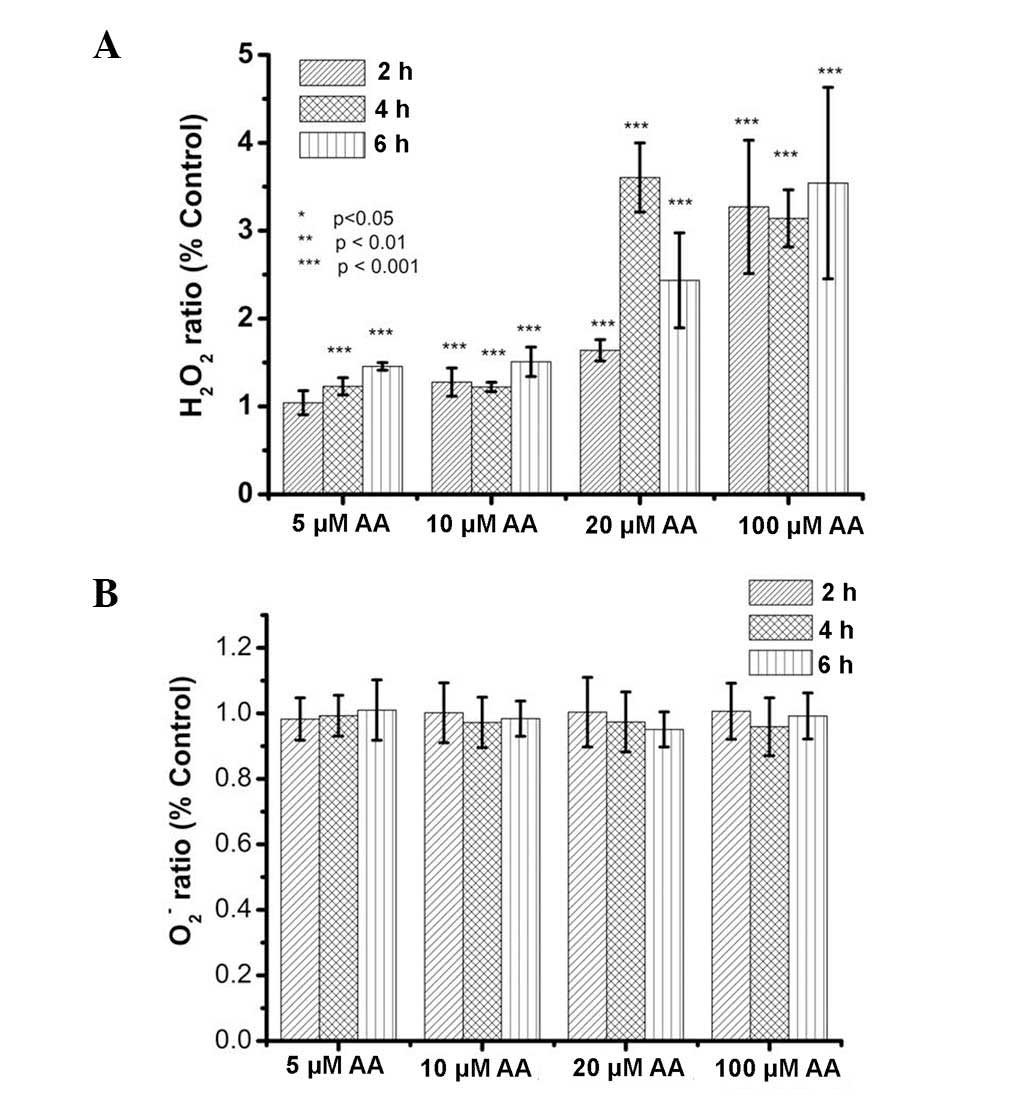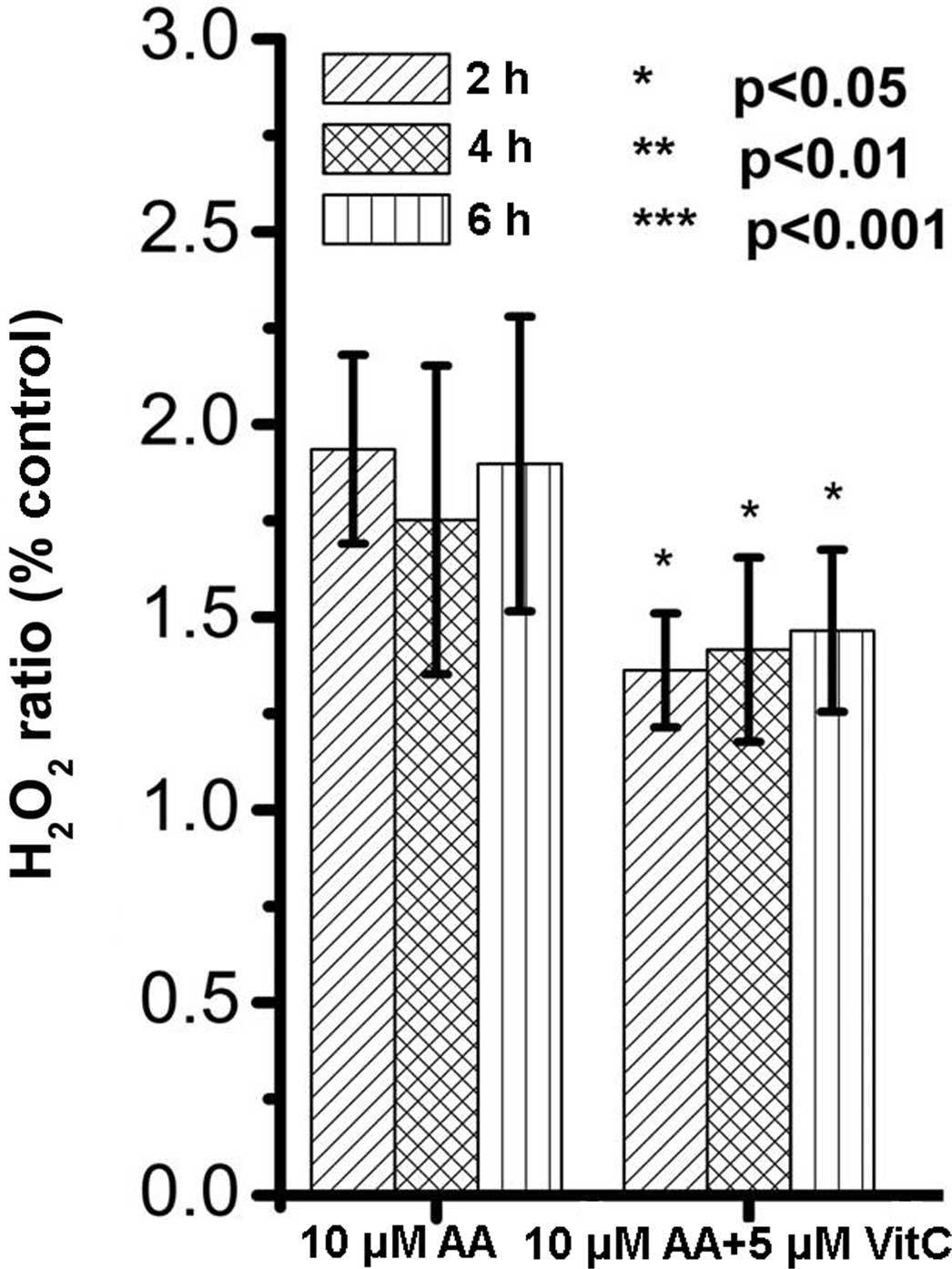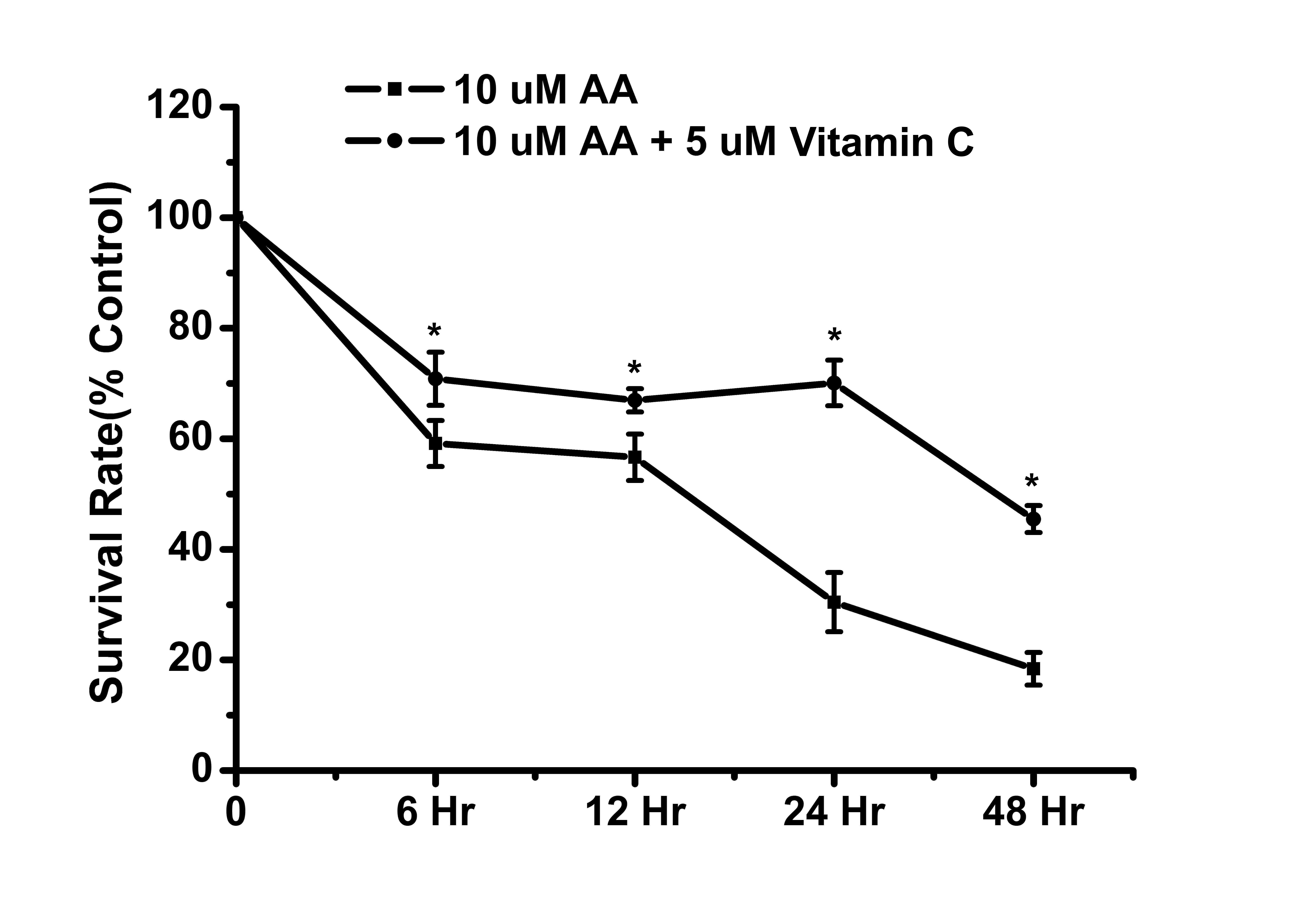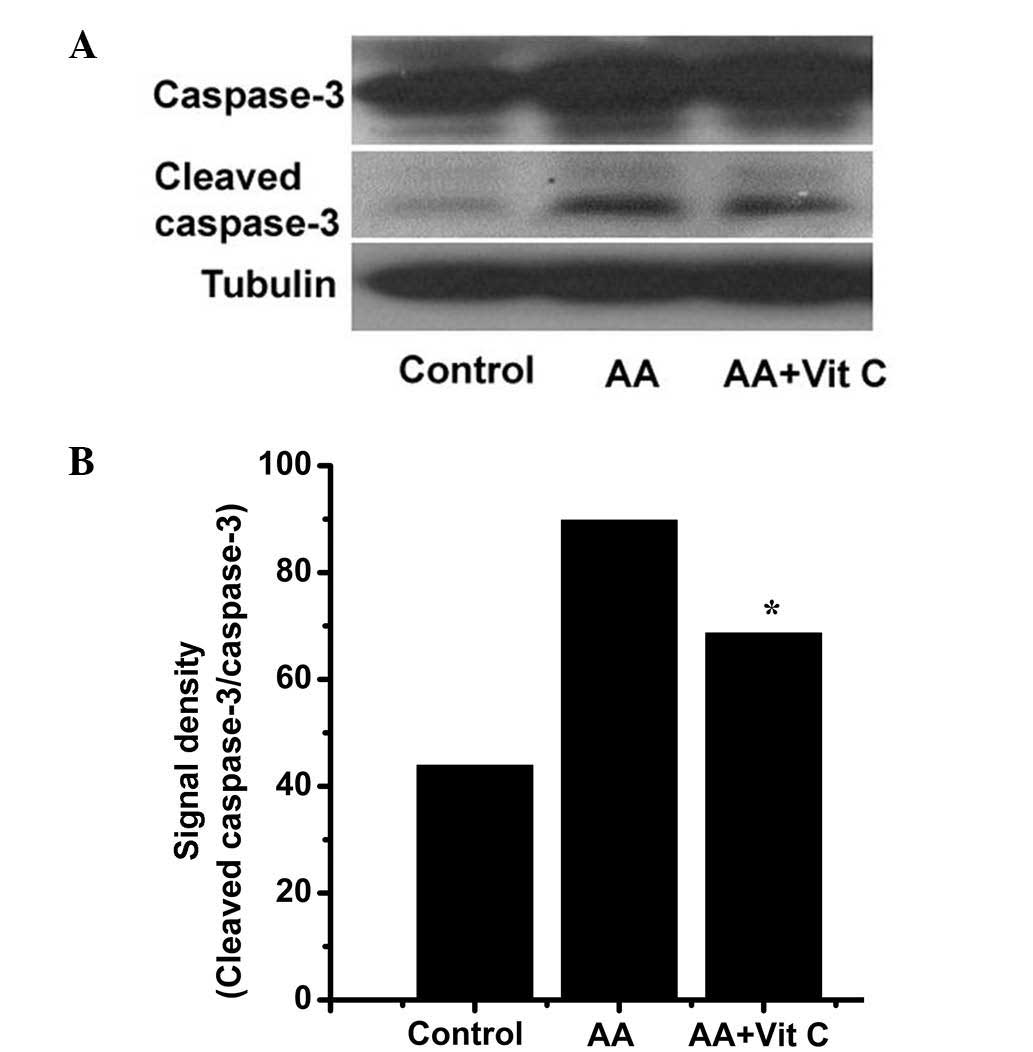|
1
|
Schaneberg BT and Khan IA: Analysis of
products suspected of containing Aristolochia or Asarum species. J
Ethnopharmacol. 94:245–249. 2004. View Article : Google Scholar : PubMed/NCBI
|
|
2
|
Schaneberg BT, Applequist WL and Khan IA:
Determination of aristolochic acid I and II in North American
species of Asarum and Aristolochia. Pharmazie. 57:686–689.
2002.PubMed/NCBI
|
|
3
|
Li XW, Morinaga O, Tian M, Uto T, Yu J,
Shang MY, Wang X, Cai SQ and Shoyama Y: Development of an Eastern
blotting technique for the visual detection of aristolochic acids
in Aristolochia and Asarum species by using a monoclonal antibody
against aristolochic acids I and II. Phytochem Anal. 24:645–653.
2013. View Article : Google Scholar : PubMed/NCBI
|
|
4
|
Feng C, Xie X, Wu M, Li C, Gao M, Liu M,
Qi X and Ren J: Tanshinone I protects mice from aristolochic acid
I-induced kidney injury by induction of CYP1A. Environ Toxicol
Pharmacol. 36:850–857. 2013. View Article : Google Scholar : PubMed/NCBI
|
|
5
|
Grollman AP: Aristolochic acid
nephropathy: Harbinger of a global iatrogenic disease. Environ Mol
Mutagen. 54:1–7. 2013. View Article : Google Scholar
|
|
6
|
Yang L, Su T, Li XM, Wang X, Cai SQ, Meng
LQ, Zou WZ and Wang HY: Aristolochic acid nephropathy: Variation in
presentation and prognosis. Nephrol Dial Transplant. 27:292–298.
2012. View Article : Google Scholar
|
|
7
|
Tsai DM, Kang JJ, Lee SS, Wang SY, Tsai
IL, Chen GY, Liao HW, Wei-Chu L, Kuo CH and Tseng YJ: Metabolomic
analysis of complex chinese remedies: Examples of induced
nephrotoxicity in the mouse from a series of remedies containing
aristolochic Acid. Evid Based Complement Alternat Med.
2013:2637572013. View Article : Google Scholar : PubMed/NCBI
|
|
8
|
Arlt VM, Stiborova M and Schmeiser HH:
Aristolochic acid as a probable human cancer hazard in herbal
remedies: A review. Mutagenesis. 17:265–277. 2002. View Article : Google Scholar : PubMed/NCBI
|
|
9
|
Heinrich M, Chan J, Wanke S, Neinhuis C
and Simmonds MS: Local uses of Aristolochia species and content of
nephrotoxic aristolochic acid 1 and 2 - a global assessment based
on bibliographic sources. J Ethnopharmacol. 125:108–144. 2009.
View Article : Google Scholar : PubMed/NCBI
|
|
10
|
Zhang J, Zhang L, Wang W and Wang H; China
National Survey of Chronic Kidney Disease Working Group:
Association between aristolochic acid and CKD: A cross-sectional
survey in China. Am J Kidney Dis. 61:918–922. 2013. View Article : Google Scholar : PubMed/NCBI
|
|
11
|
De Broe ME: Chinese herbs nephropathy and
Balkan endemic nephropathy: Toward a single entity, aristolochic
acid nephropathy. Kidney Int. 81:513–515. 2012. View Article : Google Scholar : PubMed/NCBI
|
|
12
|
Pozdzik AA, Salmon IJ, Debelle FD,
Decaestecker C, Van den Branden C, Verbeelen D, Deschodt-Lanckman
MM, Vanherweghem JL and Nortier JL: Aristolochic acid induces
proximal tubule apoptosis and epithelial to mesenchymal
transformation. Kidney Int. 73:595–607. 2008. View Article : Google Scholar
|
|
13
|
Wang Z, Zhao J, Zhang J, Wei J, Zhang J
and Huang Y: Protective effect of BMP-7 against aristolochic
acid-induced renal tubular epithelial cell injury. Toxicol Lett.
198:348–357. 2010. View Article : Google Scholar : PubMed/NCBI
|
|
14
|
Lin TC, Lee TC, Hsu SL and Yang CS: The
molecular mechanism of leptin secretion and expression induced by
aristolochic acid in kidney fibroblast. PloS One. 6:e166542011.
View Article : Google Scholar : PubMed/NCBI
|
|
15
|
Yang H, Dou Y, Zheng X, Tan Y, Cheng J, Li
L, Du Y, Zhu D and Lou Y: Cysteinyl leukotrienes synthesis is
involved in aristolochic acid I-induced apoptosis in renal proximal
tubular epithelial cells. Toxicology. 287:38–45. 2011. View Article : Google Scholar : PubMed/NCBI
|
|
16
|
Zhu S, Wang Y, Jin J, Guan C, Li M, Xi C,
Ouyang Z, Chen M, Qiu Y, Huang M, et al: Endoplasmic reticulum
stress mediates aristolochic acid I-induced apoptosis in human
renal proximal tubular epithelial cells. Toxicol In Vitro.
26:663–671. 2012. View Article : Google Scholar : PubMed/NCBI
|
|
17
|
Wang W and Zhang J: Protective effect of
erythropoietin against aristolochic acid-induced apoptosis in renal
tubular epithelial cells. Eur J Pharmacol. 588:135–140. 2008.
View Article : Google Scholar : PubMed/NCBI
|
|
18
|
Baudoux TE, Pozdzik AA, Arlt VM, De Prez
EG, Antoine MH, Quellard N, Goujon JM and Nortier JL: Probenecid
prevents acute tubular necrosis in a mouse model of aristolochic
acid nephropathy. Kidney Int. 82:1105–1113. 2012. View Article : Google Scholar : PubMed/NCBI
|
|
19
|
Cao J, Yang XD, Wang XY, Qu L, Liu G and
Li XM: Differential changes of intrarenal oxygenation in rat models
of acute tubular necrosis caused by aristolochic acid and
gentamicin. Chinese Medical Journal. 90:1208–1212. 2010.In
Chinese.
|
|
20
|
Yang L, Li X and Wang H: Possible
mechanisms explaining the tendency towards interstitial fibrosis in
aristolochic acid-induced acute tubular necrosis. Nephrol Dial
Transplant. 22:445–456. 2007. View Article : Google Scholar
|
|
21
|
Zhou Y, Bi Y, Yang C, Yang J, Jiang Y,
Meng F, Yu B, Khan M, Ma T and Yang H: Magnolol induces apoptosis
in MCF-7 human breast cancer cells through G2/M phase arrest and
caspase-independent pathway. Pharmazie. 68:755–762. 2013.PubMed/NCBI
|
|
22
|
An FF, Liu YC, Zhang WW and Liang L:
Dihydroartemisinine enhances dictamnine-induced apoptosis via a
caspase dependent pathway in human lung adenocarcinoma A549 cells.
Asian Pac J Cancer Prev. 14:5895–5900. 2013. View Article : Google Scholar : PubMed/NCBI
|
|
23
|
Wang Y, Fu W, Wang H, Liang Y, Wang Y, Yao
W, Chen W, Li Q, Ying PH, Shi X, et al: Renal microvascular injury
in chronic aristolochic acid nephropathy and protective effects of
Cozaar. Ren Fail. 34:60–67. 2012. View Article : Google Scholar
|
|
24
|
Zhang L, Li J, Jiang Z, Sun L, Mei X, Yong
B and Zhang L: Inhibition of aquaporin-1 expression by RNAi
protects against aristolochic acid I-induced apoptosis in human
proximal tubular epithelial (HK-2) cells. Biochem Biophys Res
Commun. 405:68–73. 2011. View Article : Google Scholar : PubMed/NCBI
|
|
25
|
Li J and Zhang L, Jiang Z, Shu B, Li F,
Bao Q and Zhang L: Toxicities of aristolochic acid I and
aristololactam I in cultured renal epithelial cells. Toxicol In
Vitro. 24:1092–1097. 2010. View Article : Google Scholar : PubMed/NCBI
|
|
26
|
Qi X, Cai Y, Gong L, Liu L, Chen F, Xiao
Y, Wu X, Li Y, Xue X and Ren J: Role of mitochondrial permeability
transition in human renal tubular epithelial cell death induced by
aristolochic acid. Toxicol Appl Pharmacol. 222:105–110. 2007.
View Article : Google Scholar : PubMed/NCBI
|
|
27
|
Yu FY, Wu TS, Chen TW and Liu BH:
Aristolochic acid I induced oxidative DNA damage associated with
glutathione depletion and ERK1/2 activation in human cells. Toxicol
In Vitro. 25:810–816. 2011. View Article : Google Scholar : PubMed/NCBI
|
|
28
|
Chen YY, Chung JG, Wu HC, Bau DT, Wu KY,
Kao ST, Hsiang CY, Ho TY and Chiang SY: Aristolochic acid
suppresses DNA repair and triggers oxidative DNA damage in human
kidney proximal tubular cells. Oncol Rep. 24:141–153.
2010.PubMed/NCBI
|
|
29
|
Yao CW, Piao MJ, Kim KC, Zheng J, Cha JW
and Hyun JW: 6′-o-galloylpaeoniflorin protects human keratinocytes
against oxidative stress-induced cell damage. Biomol Ther (Seoul).
21:349–357. 2013. View Article : Google Scholar
|
|
30
|
Sen S, Kawahara B, Fry NL, Farias-Eisner
R, Zhang D, Mascharak PK and Chaudhuri G: A light-activated NO
donor attenuates anchorage independent growth of cancer cells:
Important role of a cross talk between NO and other reactive oxygen
species. Arch Biochem Biophys. 540:33–40. 2013. View Article : Google Scholar : PubMed/NCBI
|
|
31
|
Kataoka T, Nishiyama Y, Yamato K, Teraoka
J, Morii Y, Sakoda A, Ishimori Y, Taguchi T and Yamaoka K:
Comparative study on the inhibitory effects of antioxidant vitamins
and radon on carbon tetrachloride-induced hepatopathy. J Radiat Res
(Tokyo). 53:830–839. 2012. View Article : Google Scholar :
|
|
32
|
Al-Rejaie SS, Abuohashish HM, Alkhamees
OA, Aleisa AM and Alroujayee AS: Gender difference following high
cholesterol diet induced renal injury and the protective role of
rutin and ascorbic acid combination in Wistar albino rats. Lipids
Health Dis. 11:412012. View Article : Google Scholar : PubMed/NCBI
|
|
33
|
Taniguchi M, A rai N, Kohno K, Ushio S and
Fukuda S: Anti-oxidative and anti-aging activities of
2-O-α-glucopyranosyl-L-ascorbic acid on human dermal fibroblasts.
Eur J Pharmacol. 674:126–131. 2012. View Article : Google Scholar
|
|
34
|
Yu YL, Su KJ, Chen CJ, Wei CW, Lin CJ,
Yiang GT, Lin SZ, Harn HJ and Chen YL: Synergistic anti-tumor
activity of isochaihulactone and paclitaxel on human lung cancer
cells. J Cell Physiol. 227:213–222. 2012. View Article : Google Scholar
|
|
35
|
Yiang GT, Chen YH, Chou PL, Chang WJ, Wei
CW and Yu YL: The NS3 protease and helicase domains of Japanese
encephalitis virus trigger cell death via caspase-dependent and
-independent pathways. Mol Med Rep. 7:826–830. 2013.PubMed/NCBI
|
|
36
|
Yiang GT, Yu YL, Chou PL, Tsai HF, Chen
LA, Chen YH, Su KJ, Wang JJ, Bau DT and Wei CW: The cytotoxic
protein can induce autophagocytosis in addition to apoptosis in
MCF-7 human breast cancer cells. In Vivo. 26:403–409.
2012.PubMed/NCBI
|
|
37
|
Yiang GT, Chou PL, Tsai HF, Chen LA, Chang
WJ, Yu YL and Wei CW: Immunotherapy for SV40 T/t antigen-induced
breast cancer by recombinant adeno-associated virus serotype 2
carrying interleukin-15 in mice. Int J Mol Med. 29:809–814.
2012.PubMed/NCBI
|
|
38
|
Wu CS, Yen CJ, Chou RH, Li ST, Huang WC,
Ren CT, Wu CY and Yu YL: Cancer-associated carbohydrate antigens as
potential biomarkers for hepatocellular carcinoma. PloS One.
7:e394662012. View Article : Google Scholar : PubMed/NCBI
|
|
39
|
Chen KH, Li PC, Lin WH, Chien CT and Low
BH: Depression by a green tea extract of alcohol-induced oxidative
stress and lipogenesis in rat liver. Biosci Biotechnol Biochem.
75:1668–1676. 2011. View Article : Google Scholar : PubMed/NCBI
|
|
40
|
Lin BR, Yu CJ, Chen WC, Lee HS, Chang HM,
Lee YC, Chien CT and Chen CF: Green tea extract supplement reduces
D-galactosamine-induced acute liver injury by inhibition of
apoptotic and proinflammatory signaling. J Biomed Sci. 16:352009.
View Article : Google Scholar : PubMed/NCBI
|
|
41
|
Yu YL, Wei CW, Chen YL, Chen MH and Yiang
GT: Immunotherapy of breast cancer by single delivery with
rAAV2-mediated interleukin-15 expression. Int J Oncol. 36:365–370.
2010.PubMed/NCBI
|
|
42
|
Yiang GT, Harn HJ, Yu YL, Hu SC, Hung YT,
Hsieh CJ, Lin SZ and Wei CW: Immunotherapy: rAAV2 expressing
interleukin-15 inhibits HeLa cell tumor growth in mice. J Biomed
Sci. 16:472009. View Article : Google Scholar : PubMed/NCBI
|
|
43
|
Yang CC, Wu CT, Chen LP, Hung KY, Liu SH
and Chiang CK: Autophagy induction promotes aristolochic
acid-I-induced renal injury in vivo and in vitro. Toxicology.
312:63–73. 2013. View Article : Google Scholar : PubMed/NCBI
|
|
44
|
Zeng Y, Yang X, Wang J, Fan J, Kong Q and
Yu X: Aristolochic acid I induced autophagy extenuates cell
apoptosis via ERK 1/2 pathway in renal tubular epithelial cells.
PloS one. 7:e303122012. View Article : Google Scholar : PubMed/NCBI
|
|
45
|
Hanus J, Zhang H, Wang Z, Liu Q, Zhou Q
and Wang S: Induction of necrotic cell death by oxidative stress in
retinal pigment epithelial cells. Cell Death Dis. 4:e9652013.
View Article : Google Scholar : PubMed/NCBI
|
|
46
|
Suzuki-Karasaki M, Ochiai T and
Suzuki-Karasaki Y: Crosstalk between mitochondrial ROS and
depolarization in the potentiation of TRAIL-induced apoptosis in
human tumor cells. Int J Oncol. 44:616–628. 2014.
|
|
47
|
Fragiadaki M, Witherden AS, Kaneko T,
Sonnylal S, Pusey CD, Bou-Gharios G and Mason RM: Interstitial
fibrosis is associated with increased COL1A2 transcription in
AA-injured renal tubular epithelial cells in vivo. Matrix Biol.
30:396–403. 2011. View Article : Google Scholar : PubMed/NCBI
|
|
48
|
Shearer J: Dioxygen and superoxide
stability of metallopeptide based mimics of nickel containing
superoxide dismutase: The influence of amine/amidate vs.
bis-amidate ligation. J Inorg Biochem. 129:145–149. 2013.
View Article : Google Scholar : PubMed/NCBI
|
|
49
|
Foresman EL and Miller FJ Jr:
Extracellular but not cytosolic superoxide dismutase protects
against oxidant-mediated endothelial dysfunction. Redox Biol.
1:292–296. 2013. View Article : Google Scholar : PubMed/NCBI
|
|
50
|
Hatem E, Berthonaud V, Dardalhon M,
Lagniel G, Baudouin-Cornu P, Huang ME, Labarre J and Chédin S:
Glutathione is essential to preserve nuclear function and cell
survival under oxidative stress. Free Radic Biol Med. 67:103–114.
2014. View Article : Google Scholar
|
|
51
|
Sullivan-Gunn MJ and Lewandowski PA:
Elevated hydrogen peroxide and decreased catalase and glutathione
peroxidase protection are associated with aging sarcopenia. BMC
Geriatr. 13:1042013. View Article : Google Scholar : PubMed/NCBI
|
|
52
|
Lin HH, Chou SA, Yang HY, Hwang YH, Kuo
CH, Kao TW, Lo TC and Chen PC: Association of blood lead and
mercury with estimated GFR in herbalists after the ban of herbs
containing aristolochic acids in Taiwan. Occup Environ Med.
70:545–551. 2013. View Article : Google Scholar : PubMed/NCBI
|
|
53
|
Ma B, Li N and Lin G: Importance of
metabolic activation study to the safe use of Chinese herbal
medicines. Curr Drug Metab. 13:652–658. 2012. View Article : Google Scholar : PubMed/NCBI
|
|
54
|
Lai JN, Tang JL and Wang JD: Observational
studies on evaluating the safety and adverse effects of traditional
Chinese medicine. Evid Based Complement Alternat Med.
2013:6978932013. View Article : Google Scholar : PubMed/NCBI
|
|
55
|
Yang HY, Wang JD, Lo TC and Chen PC:
Occupational kidney disease among Chinese herbalists exposed to
herbs containing aristolochic acids. Occup Environ Med. 68:286–290.
2011. View Article : Google Scholar
|
|
56
|
Eaton L: Traditional Chinese practitioner
breaches Medicine Act. BMJ. 340(feb19 1): c10282010. View Article : Google Scholar : PubMed/NCBI
|
|
57
|
Shang MY, Tian M, Tanaka H, Li XW, Cai SQ
and Shoyama Y: Quality control of traditional chinese medicine by
monoclonal antibody method. Curr Drug Discov Technol. 8:60–65.
2011. View Article : Google Scholar
|
|
58
|
Tian M, Tanaka H, Shang MY, Karashima S,
Chao Z, Wang X, Cai SQ and Shoyama Y: Production, characterization
of a monoclonal antibody against aristolochic acid-II and
development of its assay system. Am J Chin Med. 36:425–436. 2008.
View Article : Google Scholar : PubMed/NCBI
|
|
59
|
Hamano Y, Aoki T, Shirai R, Hatano M,
Kimura R, Ogawa M, Yokosuka O and Ueda S: Low-dose darbepoetin
alpha attenuates progression of a mouse model of aristolochic acid
nephropathy through early tubular protection. Nephron Exp Nephrol.
114:e69–e81. 2010. View Article : Google Scholar
|
|
60
|
Hsing CH, Chou W, Wang JJ, Chen HW and Yeh
CH: Propofol increases bone morphogenetic protein-7 and decreases
oxidative stress in sepsis-induced acute kidney injury. Nephrol
Dial Transplant. 26:1162–1172. 2011. View Article : Google Scholar
|
|
61
|
Parissis JT, Kourea K, Andreadou I,
Ikonomidis I, Markantonis S, Ioannidis K, Paraskevaidis I,
Iliodromitis E, Filippatos G and Kremastinos DT: Effects of
Darbepoetin Alfa on plasma mediators of oxidative and nitrosative
stress in anemic patients with chronic heart failure secondary to
ischemic or idiopathic dilated cardiomyopathy. Am J Cardiol.
103:1134–1138. 2009. View Article : Google Scholar : PubMed/NCBI
|















